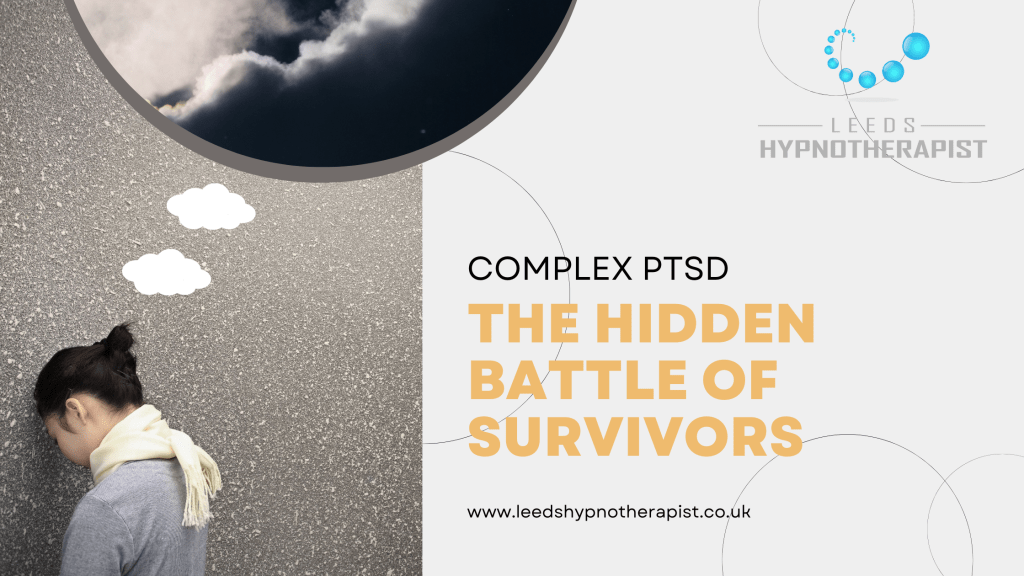Complex PTSD, also known as c-PTSD or complex posttraumatic stress disorder, is a condition that can develop after exposure to one or more traumatic events. Survivors of complex trauma may experience flashbacks, nightmares, emotional numbing and avoidance of stimuli associated with the traumatic event. Hypnotherapy has been shown to be an effective treatment for complex PTSD. In this article, we are going to look at what complex post-traumatic stress disorder is, its symptoms and how hypnotherapy can help with these.
What is Complex PTSD and What are its Symptoms?
Complex PTSD is a type of post-traumatic stress disorder that can occur after experiencing long-term or repeated trauma. Complex PTSD symptoms can be divided into three main categories: emotional, behavioural, and cognitive. Emotional symptoms may include feeling detached from others or feeling constantly on edge. Sufferers can also experience feelings of guilt, shame and isolation.
Behavioural symptoms may include self-destructive behaviours including self-harming, reckless behaviour, or substance abuse.
Cognitive symptoms may include memory problems, difficulty concentrating, or negative thinking.
Complex PTSD can be a debilitating condition that is difficult to treat, but there are several effective therapies available such as hypnotherapy. If you think you may have complex PTSD or you are showing c-ptsd symptoms, it is important to seek help from a qualified mental health professional.
What is Complex Trauma?
Trauma is a reaction to a deeply distressing or disturbing event. It can be caused by an overwhelming amount of stress that exceeds one’s ability to cope, or by experiencing an event that threatens one’s sense of safety. Trauma can occur in response to a single overwhelming event, or it can be the result of long-term exposure to stressful circumstances.
Complex trauma is a type of trauma that occurs as the result of repeated or prolonged exposure to highly stressful events. Complex trauma often occurs in the context of abusive relationships, chronic illness, or exposure to violence.
People who experience complex trauma often develop symptoms of post-traumatic stress disorder (PTSD), as well as other mental health conditions such as borderline personality disorder. Complex trauma often co-occurs with borderline personality disorder (BPD), and both conditions can be extremely debilitating.
Complex trauma can cause a range of symptoms, including dissociation, anxiety, depression, and self-harming behaviours. Complex PTSD is a complex condition that requires treatment by a qualified mental health professional. With proper treatment, many people with complex trauma are able to lead happy and fulfilling lives.
What is a Borderline Personality Disorder?
Borderline personality disorder is a mental health condition that is characterized by a cycle of emotional instability, impulsivity, and chaotic relationships. People with a borderline personality disorder often have a history of trauma, and they may struggle to manage their emotions as a result.
This can lead to impulsive behaviours, such as substance abuse, self-harm, and Reckless driving. It can also make it difficult to maintain healthy relationships.
People with a borderline personality disorder often swing between extremes of feeling confident and attractive, and feeling worthless and rejected. As a result, they may engage in risky behaviours in an attempt to feel better about themselves.
If you think you or someone you know may have a borderline personality disorder, it is important to seek professional help. With treatment, people with borderline personality disorder can learn to manage their emotions and develop healthier relationships. With the right support, recovery is possible.
How Traumatic Events Affect the Mind and Body
Traumatic memories can have a lasting effect on both the mind and the body. Individuals who have experienced traumatic events are at an increased risk for developing mental health problems such as anxiety and post-traumatic stress disorder (PTSD).
They can also cause physical symptoms such as headaches, stomach problems, and fatigue. Traumatic memories are stored in a part of the brain called the limbic system. This is the same part of the brain that controls emotional responses. When someone experiences a traumatic event, the limbic system becomes overloaded with information. This can make it difficult for the person to process and store the memory properly. As a result, the memory becomes jumbled and fragmented. The person may have trouble remembering certain details or may only remember parts of what happened.
These memories can also trigger physical reactions, such as a racing heart or sweating. In some cases, traumatic memories may be so intense that they lead to dissociation, a coping mechanism in which the individual tries to disconnect from the memory. In some cases, people may develop dissociative disorders such as amnesia or Dissociative Identity Disorder (DID). This can happen when the mind is unable to cope with the trauma and creates a new identity to protect itself. While dissociation can be helpful in the short term, it can also interfere with everyday life and make it difficult to process the trauma.
Ultimately, traumatic memories can have a profound impact on both mental and physical health. It is important to seek professional help if you are struggling to cope with a traumatic memory.
How Hypnotherapy Can Help Complex PTSD
Complex PTSD is a type of mental health condition that can develop after exposure to traumatic events. Symptoms of complex PTSD can include flashbacks, intrusive thoughts, and difficulty regulating emotions.
Hypnotherapy is a type of therapy that uses relaxation and suggestion to help people overcome psychological issues. During hypnotherapy, a therapist will guide a person into a state of relaxation and then make suggestions designed to address the person’s specific issues.
While hypnosis is often associated with stage shows and “mind control,” it has been used for centuries to help treat a variety of medical and mental health conditions. In recent years, hypnotherapy has been shown to be an effective treatment for complex PTSD.
Some research suggests that hypnotherapy may be an effective treatment for complex PTSD. One study found that 70% of participants who underwent hypnotherapy experienced a reduction in symptoms. In addition, hypnotherapy has been found to be helpful in treating other mental health conditions such as anxiety and depression.
During hypnotherapy sessions, complex PTSD patients are typically asked to imagine relaxing scenes or positive memories while the therapist talks them through the visualization. This helps to retrain the brain to respond more positively to triggers that might otherwise lead to a negative reaction.
If you are struggling with complex PTSD, consider seeking out a qualified hypnotherapist to see if this type of therapy can help you.
The Benefits of Hypnotherapy for Complex PTSD Survivors
Some of the benefits of hypnotherapy for complex PTSD survivors include:
-Reduced Symptoms of Complex PTSD
Hypnotherapy can be an effective treatment for complex PTSD, which is a type of posttraumatic stress disorder. C-PTSD symptoms can include intrusive thoughts, flashbacks, avoidance of triggers, difficulty regulating emotions, and negative changes in self-identity and self-image.
Hypnotherapy can help to reduce these symptoms by working with the subconscious mind to process trauma and release emotions that are being held onto. This can help to improve symptoms such as sleep disturbance, anxiety, and depression.
In addition, hypnotherapy can also help to increase coping skills and resilience. As a result, it can be an effective treatment for complex PTSD.
-Improved Mental Health Overall
Many people think of hypnotherapy as a way to overcome simple fears or bad habits. However, hypnotherapy can also be an effective treatment for complex mental health conditions, such as posttraumatic stress disorder (PTSD). PTSD is a debilitating condition that can occur after exposure to a traumatic event. Symptoms of PTSD can include flashbacks, nightmares, anxiety, and depression.
Hypnotherapy is an increasingly popular treatment for complex mental health conditions like PTSD. While traditional talk therapy can be helpful for some people, it can also trigger painful memories and emotions. Hypnotherapy can be an effective way to treat PTSD because it helps to break the connection between the triggering event and the negative emotions.
Hypnotherapy can help to treat PTSD by desensitizing the individual to the trauma and by providing coping and relaxation techniques. In addition, hypnotherapy can also help to improve mental health overall by reducing stress and anxiety and increasing feelings of well-being and self-esteem.
-Better Sleep Quality
Sleep is critical for our overall health and well-being, but for many people, getting a good night’s rest is a real challenge. If you’re struggling to sleep, you may be wondering if hypnotherapy could help.
There’s no one-size-fits-all answer to this question, as the effectiveness of hypnotherapy for sleep will depend on the individual and the underlying cause of their sleep problem. However, hypnotherapy can be an effective treatment for a variety of sleep disorders, including complex PTSD, prolonged trauma, and posttraumatic stress disorder.
Prolonged trauma can lead to a variety of sleep problems, including difficulty falling asleep, waking up frequently during the night, and feeling exhausted during the day. These problems can make it difficult to function in daily life and can trigger or exacerbate other symptoms of complex PTSD.
Hypnotherapy can help to promote relaxation and reduce stress, both of which are key factors in improving sleep quality. In addition, hypnotherapy can also be used to address any negative beliefs or associations that may be contributing to your sleep problem.
If you’re considering hypnotherapy for better sleep, it’s important to consult with a qualified therapist who has experience treating sleep disorders. Together, you can explore whether hypnotherapy is right for you and develop a treatment plan that meets your needs.
-Reduced Anxiety and Depression Symptoms
Anxiety and depression are common mental health disorders that can have a profound negative impact on overall health and well-being. Hypnotherapy has emerged as a promising treatment option for reducing anxiety and depression symptoms.
One study found that hypnotherapy was effective in reducing complex PTSD symptoms in individuals who had experienced prolonged trauma. Furthermore, another study found that hypnotherapy was an effective treatment for posttraumatic stress disorder.
These studies suggest that hypnotherapy may be a helpful treatment option for reducing anxiety and depression symptoms.
-Improved Coping Skills
Hypnotherapy can be a helpful tool for those who have experienced chronic trauma, such as childhood abuse or complex posttraumatic stress disorder. One of the challenges of chronic trauma is that it can lead to a sense of powerlessness and isolation.
Hypnotherapy can help to break this cycle by teaching coping skills and empowering the individual to take control of their own healing process. In addition, hypnotherapy can help to reduce anxiety, ease chronic pain, and improve sleep.
For many people, hypnotherapy provides a sense of hope and relief from the crippling effects of chronic trauma. Hypnotherapy can help people with complex posttraumatic stress disorder to redirect their negative thoughts and emotions. As a result, hypnotherapy can be an extremely helpful tool for people who have experienced trauma.
-Better Quality of Life
Hypnotherapy is an increasingly popular treatment option for mental health issues. While it is often associated with stage hypnosis, clinical hypnosis is a different process entirely. Mental health professionals use clinical hypnosis to help patients access buried memories and emotions, which can then be processed and healed. This can be an incredibly effective treatment for repeated trauma and emotional regulation.
In addition, hypnotherapy can also help with issues like anxiety, depression, and pain management. As a result, it can lead to a better quality of life for those who suffer from mental health issues.
If you are struggling with mental health issues, consider seeking out a mental health professional who offers hypnotherapy as a treatment option. It could make a world of difference in your quality of life.
How to Find a Therapist Who Specializes in Complex PTSD
If you’re struggling with complex PTSD, you may be feeling isolated, hopeless, and trapped in a cycle of negative thoughts and behaviours. You may have tried to talk to family and friends about what you’re going through, but they may not understand what you’re dealing with. However, there is hope. There are mental health professionals who specialize in treating complex trauma disorder. These therapists can provide you with the support and tools you need to heal from your experiences. Here are a few tips for finding a therapist who specializes in complex PTSD:
– Ask your doctor or another mental health professional for a referral. They may know of someone who is specifically trained to treat complex PTSD.
– Look for a therapist who is listed as a provider for Complex PTSD on the website of the National Institute for the Treatment of Trauma and Dissociation (NITTD). NITTD is an organization that provides resources and information about complex PTSD.
– Once you’ve compiled a list of potential therapists, you can then research each one to learn more about their experience and treatment approach.
– When you narrow down your list, you can then contact the therapists to schedule an initial consultation.
– Make sure the therapist you’re considering is experienced in treating complex PTSD. Ask about their training and experience in treating this disorder.
– Do some research and ask around until you find a therapist who you feel comfortable with and who has the experience necessary to help you heal from complex PTSD. With the right support, you can begin to reach your full potential.
As a hypnotherapist with years of experience helping people who have been through sexual and physical abuse, I understand how hard it can be to find the right person to not only trust and feel comfortable about working with but can also help you to work through each deeply traumatic experience. Whilst interpersonal trauma affecting your daily life might be what is normal for you right now, it doesn’t mean that it has to be your future.
What to Expect in a Therapy Session for C-PTSD
C-PTSD is a condition that can be caused by prolonged exposure to traumatic events. Symptoms of c-PTSD include hypervigilance, flashbacks, and avoidance of triggers. c-PTSD can also cause problems with relationships, work, and daily activities.
Therapy for c-PTSD may involve individual or group sessions. During therapy, you may discuss your symptoms and experiences in order to gain a better understanding of your c-PTSD. You may also work on coping mechanisms and explore alternatives to unhealthy behaviours. In some cases, hypnosis may be used to help manage symptoms. c-PTSD therapy can be an effective way to reduce symptoms and improve your quality of life.
During a hypnosis session, you will learn how to release the emotional charge connected to traumatic events. This traumatic stress is what binds you to the suffering of the events and unable to work through them.
You may also find that some sessions are about changing the way that your mind thinks and reacts to certain stimuli. This then means that you are no longer being triggered by things and you feel more confident about daily life.
Questions to Ask Your Therapist if You Have Complex Post-Traumatic Stress Disorder
- What experience do you have in treating complex PTSD?
- What is your approach to treating complex PTSD?
- What kind of training have you had in treating complex PTSD?
- How long have you been treating patients with complex PTSD?
- Do you use any specific techniques when treating patients with complex PTSD?
- Can you give me an example of how you would treat a patient with complex PTSD?
- What are the success rates for patients who receive treatment for complex PTSD?
Hypnotherapy for Complex PTSD
Hypnotherapy has been shown to be an effective treatment for complex PTSD. If you’re struggling with symptoms of complex PTSD, consider seeking out a therapist who is specifically trained in treating this disorder. With the right support, you can begin to heal and move on from the trauma you’ve experienced.
If you have been suffering from complex PTSD you can arrange a free consultation to discuss your issues and see how hypnotherapy can help. All you need to do is go to the contact page and complete the form or if you are on your mobile device you can tap the Whatsapp button and send me a message through that.




